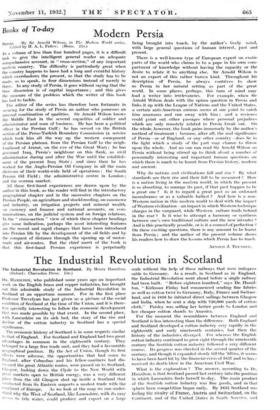Persia. By Sir Arnold. Wilson, in The Modern World series.
Edited by A. A. L. Fisher. (Bann. 21s.)
Isz a volume of less than four hundred pages, it is a difficult task to give the intelligent general reader an adequate comprehensiVe account, in " cross-section," of any important modern country. The difficulty is particularly great when the country happens to have had a long and eventful history which overstadows the present, so that the study has to be made, so to speak, in four dimensions instead of merely in three. In any study of Persia, it goes without saying that the time dimension is of capital importance ; and this gives the measure of the problem which the writer of this book has had to tackle.
The editor of the series has therefore been fortunate in securing for the study of Persia an author who possesses an unusual combination of qualities. Sir Arnold Wilson knows the Middle East in the several capacities of soldier and administrator and man of business. He has been a political officer in the Persian Gulf ; he has served on the British section of the Perso-Turkish Boundary Commission (a service which took him all. the way up the western escarpment of the Persian plateau, from the Persian Gulf to the neigh- bourhood of Ararat, on the eve of the Great War) ; he has governed hack Persia's neighbour on this flank, as civil administrator during and after the War until the establish- ment of the present Iraq State ; and since then he has worked for the Anglo-Persian Oil Company in all the main divisions of their world-wide field of operations : the South Persian Oil Field ; the administrative centre in London ; and the oversea market.
All these first-hand experiences are drawn upon by the author in this book, as the reader will find in the introductory geographical chapter and in the successive chapters on the Persian People, on agriculture and stockbreeding, on commerce and industry, on irrigation projects and mineral wealth, on currency and finance and national accounts, on com- munications, on the judicial system and on foreign relations. In the " cross-section " view of which these chapter headings give sonic indication, perhaps the most interesting features are the recent and rapid changes that have been introduced into Persian life by the development of the oil fields and by the conquest of distance through the opening up of motor- roads and air-routes. But the chief merit of the book is that this first-hand Persian experience is perpetually being brought into touch, by the author's lively mind, with large general questions of human interest, past and present.
There is a well-known type of European expert on exotic parts of the world who claims to be a pope in his own com- partment of knowledge without having the capacity or the desire to relate it to anything else. Sir Arnold Wilson is not an expert of this rather barren kind. Throughout his description of Persia, he always contrives to show us Persia in her natural setting as part of the great world. In some places, perhaps, this turn of mind may lead a writer into irrelevancies. For example, when Sir Arnold Wilson deals with the opium question in Persia and links it up with the League of Nations and the United States, a certain anti-American animus seems at one point to catch him unawares and run away with him ; and a reviewer could point out other passages where personal prejudice,: which are only remotely related to Persia break out. On the whole, however, the book gains immensely by the author's method of treatment ; because, after all, the real significance of Persia—or of England, or any other country—does lie in the light which a study of the part may chance to throw upon the whole. And no one can read Sir Arnold Wilson on Persia without being stirred up to think about a number of perennially interesting and important human questions on which there is nuich to be learnt from Persian history, modern and ancient.
Why do nations and civilizations fall and rise ? By what standards are their rise and their fall to be measured ? how is a nation living in the modern world, in which the present is so absorbing, to manage its past, if that past happen to tie
a great one Is it to regard a great past as an awkward incumbrance or as a valuable ballast ? And how is a non- Western nation in this modern world to deal with the impact of Western civilization—an impact in which Western technique charges in the vanguard, while Western culture trails behind in the rear ? Is it wise to attempt a harmony or synthesis between one's own traditional culture and the new intruder ? And is this practically possible, or is it a counsel of perfection ? On these exciting questions, there is any amount to be learnt from Persia ; and the author of the present volume shows his readers how to draw the lessons which Persia has to teach.
ARNOLD J. TOYNDER.






























 Previous page
Previous page